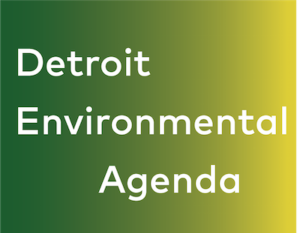Myya Jones
Candidate for Mayor

Q: Where can people go to learn more about your biography? If not readily available online, please describe in 150 words or less, your relevant experience, public offices held (if any), involvement in environmental causes, and membership in any environmental organizations. If you currently hold office, describe any votes or actions demonstrating concern for the environment.
A: https://myyaformayor.com/meetmyya-2/
Community
Q: If elected, how will you work with Detroit residents to ensure that they benefit from and partake in the decision-making surrounding local development projects and that potential adverse impacts of those projects are identified, measured, monitored and mitigated? Moreover, how would you work to put more power into the hands of residents to maintain and revitalize their own communities and to access vacant land through the DLBA?
A: Improving the quality of life in Detroit starts with acknowledging all of the gaps in our local system and developing plans and strong policy to address them. The development of a resident-driven City-wide Master Plan can help us with making proper assessments of our neighborhoods using both statistical data from digital sources and anecdotal data from residents. Without an up-to-date Master Plan in place, city government cannot comprehensively tackle the most significant social ills in our neighborhoods. However, this is exactly what is happening today. Even well intentioned leaders make poor decisions when local priorities are misaligned with residents’ actual needs.
Under my leadership, social justice considerations will be central to all land use planning initiatives and intentionally inclusive of all stakeholders to ensure our results produce a higher quality of living for our neighborhoods. I will work with Detroit residents to ensure the inclusion of disadvantaged groups in planning processes and planning initiatives, but especially those that may result in gentrification and/or cause displacement and/or diminish protections for low-income neighborhoods or housing. This means giving residents a seat at the table throughout the entire planning process.
As a result of the economic growth in Downtown, Midtown, and some other well-to-do neighborhoods in Detroit, we have essentially become a living tale of two cities. While increasing the amount of economic activity occurring within Detroit is necessary, it is not a sufficient condition for generating broadly shared prosperity in the city.
Currently, Detroit has 24,000 fewer units of habitable housing than the number of households in the city. This means the thousands of residents who lose their homes to foreclosure and eviction every year are met with a shortage of other potential housing options, and instead they will likely move out of the city, move into blighted housing, double up with other families, or rely on homeless shelters.
I support housing policies and plans that reinforce the development of strong, vibrant, safe neighborhoods. This includes programming to support home repair for seniors and low-income residents, tax payment assistance for homeowners, financial assistance for renters, and comprehensive homeownership pipelines for renters. My administration will also raise the standard for affordable housing development in the City of Detroit ensuring where possible that affordability does not exceed the City of Detroit’s area median income (AMI) and that homeowners who want to live in this City can stay.
There will be a complete restructuring of the Detroit Land Bank Authority, which is currently working in the disinterest of residents. Detroit citizens should have direct access to the Land Bank.
Q: If elected, what budget appropriations would you propose to increase investment in needed social and environmental services to help improve the quality of life and health of Detroit residents?
A: The Detroit City Council recently approved a $1.1 billion budget for the 2021-22 fiscal year with nearly 30% going to the Detroit Police Department. If we want to decrease crime, we have to decrease poverty and invest into the quality of life and health of Detroiters.
The city budget needs to be revised to allocate more funding to vulnerable groups, such as the elderly, residents with disabilities, individuals with mental illness, and low-income residents, we need more access to health care and amenities that provide healthy options, such as fresh foods, safe places to exercise, quality health services, non-motorized transportation facilities, and clean and safe environments. In addition, we need to ensure reduced exposure to polluted and dangerous environments for us residents in low-income neighborhoods.
To promote use of and inclusion in Detroit’s parks and recreation system, my administration will evaluate current park systems and address inequities with both investment and engagement of the community. The loss of community centers in our neighborhoods has been a painful experience for us residents who know firsthand how these facilities served as safe spaces in the community. To begin restoring this, my administration is excited to partner closely with many of our city’s existing religious institutions and provide direct resources and funding to support wider reaching recreational programming across Detroit. Improving the quality of life in Detroit starts with acknowledging all of the gaps in our local system and developing plans and strong policy to address them.
Public Health
Q: What long term solutions do you see for addressing vehicle speeds and making our streets safer?
A: Reducing the number of speeding drivers in neighborhoods is vitally important, as community members are aware that speeding puts children, pedestrians, and other drivers in danger.
For years, we have advocated for speed bumps but we have not been a priority by the current administration. Speed bumps are an essential tool when it comes to slowing down traffic, especially in residential neighborhoods. Speed bumps need to be implemented in residential neighborhoods immediately.
Speed limits need to be enforced, especially during periods where children are walking to school. Similar to non-smoking, non-drug use, or drunk driving advertisement campaigns, the City of Detroit needs to create a campaign of the like for speeding to educate drivers on the dangers and life threatening consequences.
I support efforts that foster meaningful citizen engagement and give citizens a voice in safety and crime prevention initiatives – even when it comes to combating speeding.
Q: How will you work to reduce the negative health impacts of air quality on the residents of Detroit?
A: All Detroiters have the right to a safe and healthy neighborhood free from pollution. My administration will be dedicated to improving the environmental health of our community by developing resources and funding and implementing programs that help clean up polluted areas in all communities. This especially includes “industrial adjacent” neighborhoods such as those near the Marathon refinery that battle with air and ground water pollution at rates higher than anywhere else in the state.
I plan to implement stronger regulatory approaches that set specific standards across polluters and require polluters to meet these emissions standards. Businesses that are dedicated to demonstrating their corporate responsibility by meeting these emissions standards will be met with economic incentives, while those who do not will be fined.
It is important that residents in our most polluted zip codes know that we are at the table fighting for them every day and are including them in the process. I will not sleep until residents in the most environmentally vulnerable communities have access to quality air and water.
Q: If elected, what actions will you take to work toward safer, healthier, and more affordable housing for all Detroiters?
A: Amid the more than 20,000 demolitions over the last decade, the city has lost some highly notable and invaluable structures. I will be committed to ensuring future demolitions are highly considerate of the historical value of Detroit’s housing stock and drafting ordinances, text amendments, and other regulatory policies that preserve the historic resources of our communities. Thousands of residents who lose homes to foreclosure and eviction every year are met with a shortage of other potential housing options, and will likely move out of the city, move into blighted housing, double up with other families, or rely on homeless shelters. Instead of demolitions, I support housing policies and plans that reinforce the development of strong, vibrant, safe neighborhoods. This includes programming to support home repairs, tax payment assistance for homeowners, financial assistance for renters, and comprehensive homeownership pipelines for renters.
Aggressive development of skilled trades/job training programs in carpentry, constructions, and other home improvement industries is a top priority. My vision is to structure a home improvement program that creates good quality jobs for Detroiters, including returning citizens, while also renovating residential homes. These updates will include but are not limited to new appliances, getting rid of hazards such as lead paint and asbestos, window updates, new water heaters and furnaces, and even landscaping updates. Instead of using federal dollars for demolitions, we would focus on rehabilitation. This will help us realize the development of strong, vibrant, safe neighborhoods, while putting Detroiters to work and improving our quality of life.
My administration will also raise the standard for affordable housing development in the City of Detroit ensuring where possible that affordability does not exceed the City of Detroit’s area median income (AMI) and that homeowners who want to live in this City can stay.
Energy
Q: What are your priorities to reduce emissions and lessen the impacts of climate change in Detroit during your term in office?
A: To reduce greenhouse gas emissions and lessen the impact of climate change in Detroit, I plan to implement a solar energy plan to get Detroiters solar panels and increase DTE’s rooftop solar potential. Solar energy benefits society by: reducing air pollution, reducing water usage, improves residents health in the long run, and healths fight climate change. For residents, this means lower energy bills. Increase in property value, staying connected and in control of their power, and staying powered during blackouts.
Assisting residents to offset the initial cost of solar panels will be crucial. I am a strong supporter of alternative energy solutions that will lessen the impact of climate change in Detroit and the health of our citizens.
Q: What are your plans for helping the city transition to renewable energy and how will you ensure that the cost benefits and increased resilience that come from the use of renewables is made accessible to low-income and vulnerable communities across Detroit?
A: As mentioned, assisting residents with offsetting the initial cost to have access to solar energy will be crucial. I will advocate for tax credit programs and incentive programs to be made available for residents. I will also work with the state legislature to implement these programs at the state level. For low income residents, we will allocate funds to off-set majority of the cost, if not completely.
Recycling
Q: How can the city increase recycling, composting, and the use of post-consumer recycled materials, while addressing the city’s litter and illegal dumping problem?
A: Lack of knowledge and information is a big issue here in Detroit. Most residents do not know that the city offers free, curbside recycling to all single-family homes and buildings with 1-4 units and that they must request the cart themselves. Most residents believe that they are required to pay for the recycling bin and that fees are incurred. Most residents also do not know that we have free dumpsites.
To increase recycling, composting, and the use of post-consumer recycled materials, while addressing the city’s litter and illegal dumping problem, my main proposal will be educating residents on these free services. This also includes educating residents on the rules for bulk pick up.
Jobs
Q: What steps would you take to prepare the local workforce to take advantage of and be part of the movement toward a green economy, through qualifying for good paying infrastructure and clean energy jobs, amongst others?
A: A key component to achieving economic equity is reducing the barriers many Detroiters face to accessing the new employment opportunities in the city.
To ensure we have the talent to fill roles with new industries, aggressive development of skilled trades and other job training programs is a top priority. I also believe in structuring economic development programs in a way that provides paid job training opportunities.
Water
Q: How will you ensure that clean water is accessible and affordable to all Detroiters?
A: Water is a fundamental human right. In Detroit, there is a problem of dire poverty, and the issue is affordability to the poorest citizens. This crisis is a local, state, and federal government issue that my administration will remain consistently vocal on. We will urge Michigan’s politicians at all levels to put this issue on the top of their agenda. We will navigate this crisis not just as a poverty issue but as a political issue as well. How can we ask citizens to vote or be civically engaged when their extremely basic need — access to water — is compromised?
The city must restore water to people who cannot pay, while distinguishing them from people who simply will not pay. We have to figure out how to cover the costs of subsidizing water for the poor without further raising rates for households of more modest incomes (because water bills in Detroit are already well above the national average).
Q: How will you help municipal agencies and property owners integrate Green Stormwater Infrastructure (GSI) across the city to manage stormwater and reduce drainage charge fees for property owners?
A: The Green Stormwater Infrastructure Projects have not been updated on the city website for many years. One can ask if it is a priority of the current administration. The first step to helping municipal agencies and property owners integrate Green Stormwater Infrastructure (GSI) across the city to manage stormwater and reduce drainage charge fees for property owners is once again education and prioritization. The Detroit Water and Sewage Department needs to give a public update on what has been done with the GSI Projects so we can create a plan to move forward.
Optional
Q: Please identify the top environmental concerns to you personally, identify the environmental issue in your community that is the most pressing, and what you would like to do as an elected official to address this most pressing concern.
A: All of the issues stated in my questionnaire are top concerns for me. Detroit residents can see the majority of the issues are stated on my website. Access to affordable decent housing, jobs, parks and recreation, keeping our streets clean, etc. are what I plan to advocate for if elected or not.

